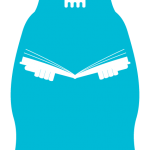Every morning when I wake up, I shuffle my oracle deck and spread three cards out on my bedspread. This is a new routine for me; I received the deck for my birthday, and I still have to look up each card in the accompanying booklet to discover its meaning. I like the ritual of it. The cards, smooth and slippery; the drawings that suggest more than they declare. The way the cards nudge me, gently, to acknowledge how I’m really feeling about the events of my life—my anxieties, my internal roadblocks, my deepest wishes. The latent brought to the surface. The mess of my mind given tidy, understandable form.
I do not believe my cards predict the future. But sometimes, in spite of myself, I can’t help but sense larger forces at work. Certain cards want to be pulled; they make my fingertips tingle. Others say, move on, keep shuffling. Part of me—the part that’s still just waking up, still fuzzy with dreams and nightmares—believes the universe is telling me something, each morning, here in my bed, if only I would listen.
#
Sometimes, I have the sense of my life splitting into different timelines as I’m living it.
Once, when I was a child, riding my bike home from my friend’s, I hit a bump on the sidewalk and nearly choked on the hard candy I was sucking on. I was right across the street from my house when it happened—the moment when I felt the candy lodge in my throat. As I gagged, and tried to swallow, I stared at the blank windows of my house, thinking: if only I’d saved the candy until I got home. If only I’d been more careful on my bike.
Now, decades later, I tell myself that this experience was a warning: the universe telling me to take care when I chew and swallow. As if this were a moment upon which my later life hinged, and if I remembered it, if I kept it close as the sign it was, then I’d stay safe. To this day I’m nervous about hard candies. Grapes. Cherry tomatoes. Chewing gum.
Eventually the candy went down. Eventually I got back on my bike and rode across the street, home, crying to my mother. But sometimes I think maybe I didn’t. Maybe I died there, in sight of my house. Maybe I’m dying still. Maybe all of my memories since then are an oxygen-deprived hallucination.
#
We are an inherently storytelling species. We scrawl drawings on cave walls, inscribe tablets with letters. The stories we hear as children—fables, fairy tales, parables—help us see the world as something understandable. Something with a beginning (once upon a time) and an end (and they all lived happily ever after.) The stories we tell ourselves follow the same formula; the three oracle cards I pull from the deck represent past, present, and future: my life in a neat, straight line.
When we get a bit older, we set up dominoes—in straight lines and curves, in increasingly elaborate trails—and we watch with satisfaction as a single nudge from a finger sets the entire thing in motion, revealing designs we couldn’t see before they all fell down. We begin to understand that the dominoes are a metaphor. We learn that history is filled with inflection points: moments of decision at which millions of possible futures hover, waiting breathlessly to see which one will solidify into reality, waiting to see which domino will be tipped over.
The thing is, we don’t know, when we’ve blithely tipped over that first domino, what we’ve done. It’s only in retrospect—days, months, years later—that we can see the larger shape of our actions. That, too, is a form of storytelling. A way of making sense, of creating meaning. A culling of events, like chiseling away at a block of marble, until a sculpture emerges.
Because, of course, that first domino wasn’t really the first domino. Nothing ever happens in a vacuum. It’s dominoes all the way down.
#
The part I didn’t tell you about the hard candy story is that when I went inside, throat raw and cheeks tear-stained, my mother was irritated and abrupt. I was supposed to have been home earlier, and now we were running late for an appointment scheduled later that afternoon. I had a history of running late, particularly when it came to appointments I was dreading. I also had a history of malingering, of imagining myself mortally injured, of faking stomach aches to get sent home from school. That’s the context of my mother’s annoyance, her quick brushing aside of my wails that I’d just nearly choked to death. And while this was a traumatic, formative event in my life, she most likely doesn’t even remember it. For her, this was just one of the many times I was late, even though she’d told me over and over again to be home on time. Each of us locked inside our own lives, our own narratives, thrust into confusion when our narratives intersect.
But that’s not as good of a story, is it? The context just makes things messier; it’s harder to find a through-line, a narrative thread, a singular moment that echoes into the future. Whose story is this, anyway? What does it all mean?
On the other hand, when I end the story at the moment I finally manage to swallow the candy down, its meaning is more clear. For me, the hard candy is a harbinger of many possible futures. If I never choke to death, it’s because I heeded that warning, that sign. And if, some day, a bite of food becomes lodged in my windpipe—well, in those final moments, before I lose consciousness, I will probably remember that day my bicycle hit a bump on the sidewalk. I will tell myself, just before I black out, I always knew this was going to happen.
#
Like most people, I often struggle making decisions. Sometimes, when the decision is small and relatively inconsequential, I amuse myself by looking for signs. If there’s an available parking space in front of the store, I’ll tell myself, that means it’s okay for me to go in and buy myself a book. Or, If the rain stops within the next ten minutes, that’s the universe saying I should really go for a walk. I tell myself these things because choices are scary, even the little ones. Especially the little ones. Big decisions often take lots of thought and discussion, the writing of pro and con lists, a good night’s sleep to mull things over. But we don’t have that luxury with the hundreds of tiny choices we make each day. And each choice has the potential to split the universe into pieces, to send us all down a different track. How can any of us do anything with that kind of pressure?
So I construct a narrative, where there seemed only to be chaos. I congratulate myself on listening to fate. I look back at the card I pulled from my oracle deck a week ago, and say, Ah! Now it all makes sense! And later, when I tell the story about how, on my walk, I spotted my neighbor’s lost dog and was able to bring him home, I’ll say, “The rain stopped at exactly the right time for me to go on that walk.” I’ll say, “See? It was meant to happen.”
#
We are a storytelling species. The stories I tell myself give me a sense of agency and control. But they also, at the same time, have the potential to fill me with a sense of dread, of paralysis. Each day, every moment, I feel as though the world is experiencing a tipping point. That we—all of us, everywhere—are approaching a track shift, an irreversible branch in our cosmic road. It is far too easy for me to envision the frightening futures ahead. It is difficult for me, sometimes, to imagine alternatives.
And that is the problem. What do we do, when the signs around us all point to one inevitable story? What is our responsibility? Do we just give up, and let those dominoes fall?
I refuse that answer. Actively and repeatedly, I refuse it. We are always tipping. All of us; all the time. We are constantly on the verge of creating a different future, a different past, a different story. Symbols matter. Stories matter. We need them to gather ourselves up, to do the right thing. To create meaning. But there is not just one domino. There is never just one choice.
#
Tomorrow morning, I will wake up, and stretch, and sit upright. I will spread the oracle cards out on my bedspread, use the palms of my hands to swirl them around the way I’ve seen dealers do at casinos, to shuffle them without bending the edges. Then I will gather them back into a deck, smooth the sides, and deal out three cards in a row. I’ll pore through the booklet to determine what the cards are saying to me: the truths they’re prompting me to acknowledge, the buried memories they’re bringing to light. I’ll think about my day ahead, and wonder if I should set a different intention, alter my decided-upon schedule, make a new choice.
What I’m asking myself is, how can I prepare myself for the future? How can I open myself up to possibility without drowning in it? Where is the sliver of control I can cling to, the necessary fiction that I might be able to avoid heartbreak, explain hardship, and ultimately guide myself to an ending that makes sense?
What I’m asking myself is, What does it mean?
What does it mean?
###
Jennifer Hudak is a speculative fiction writer fueled mostly by tea. Her work has appeared on both the Locus Magazine and the SFWA recommended reading lists, and has been twice nominated for a Pushcart Prize. Originally from Boston, she now lives with her family in Upstate New York where she teaches yoga, knits pocket-sized animals, and misses the ocean. Find out more about her on her website: jenniferhudakwrites.com.
Photo by Viva Luna Studios on Unsplash






